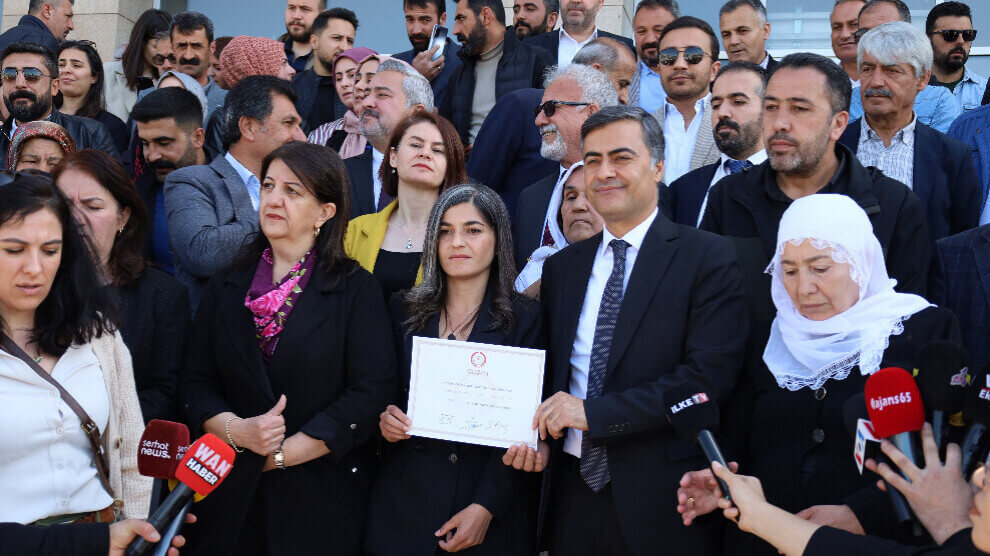A mayor from Turkey’s main pro-Kurdish party faces removal from office after the Supreme Court of Appeals reversed a 2023 lower court decision that had restored his right to run for office, according to the state-run Anadolu news agency.
The top appeals court’s decision concerns Abdullah Zeydan of the pro-Kurdish Peoples’ Equality and Democracy Party (DEM Party), who won the race for mayor of the eastern province of Van, which sits on Turkey’s eastern border with Iran, garnering over 55 percent of the vote in the local election held on March 31.
A local electoral authority initially cancelled Zeydan’s victory on the grounds that he was ineligible to stand for election, prompting protests in the city in April. Their decision followed the last-minute reversal of a verdict from the Diyarbakır 5th High Criminal Court that had restored his right to run for office.
After violent protests against his ouster erupted in Van and spread across the country, Turkey’s Supreme Election Council (YSK) approved an appeal made by the DEM Party of the decision that annulled Zeydan’s victory. With the approval of the appeal, the mandate to serve as Van’s mayor was eventually given to Zeydan.
Zeydan’s situation has taken a new turn with a decision from the 3rd Chamber of the Supreme Court of Appeals overturning the 2023 ruling from the Diyarbakır 5th High Criminal Court that restored his right to run for office.
The appeals court said the Diyarbakır court’s decision lacked the necessary legal grounds for the restoration of the politician’s right to run for office. The court said a three-year period should have expired after Zeydan’s release from prison before the restoration of his right to run for office. This interim period would terminate on December 20,2025 in Zeydan’s case.
The appeals court sent Zeydan’s file back to the Diyarbakır 5th High Criminal Court to revisit its decision.
The reason the politician faced a political ban stems from a government crackdown on the Kurdish political movement in the aftermath of a coup attempt in July 2016.
Zeydan, who had been elected on the ticket of the Peoples’ Democratic Party (HDP) — the predecessor of the DEM Party — in 2015, was arrested in 2016 after criticizing the Turkish army’s air campaign against Kurdish militants in the Kurdish-majority southeast. He spent almost five years behind bars on terrorism-related charges and was released in January 2022.
Kurdish politicians like Zeydan and some of their supporters in Turkey are frequently accused of having links to the outlawed Kurdistan Workers’ Party (PKK), listed as a terrorist organization by Turkey and its Western allies. They deny the accusations.
A defiant Zeydan called on his supporters to unite against the top court’s decision against him and stand up for their will to be represented.
He said on the social media platform X that he is now being said, “Sorry, we made a mistake in calculation, we are taking your rights back,” after he was allowed to run in the local election and won the seat.
He said the people who voted for him on March 31 will never allow their city to be run by “thieves, looters and gangs,” who do not deserve that position.
Önce yerel mahkeme “ memnu haklarınızı’’ geri verecek, seçime gireceksiniz ve % 55.5 oyla eş başkan seçileceksiniz. Sonra da ‘’kusura bakmayın! Biz yanlış hesap yapmışız, memnu haklarınızı geri alıyoruz’’ diyeceksiniz. Yüz binlerin iradesini, seçme-seçilme hakkını nereye… pic.twitter.com/z5y19id1qx
— Abdullah Zeydan (@AbdullahZeydan) December 3, 2024
When democratically elected mayors are removed from their posts, a practice which began in Turkey as early as 2016, they are replaced by government-appointed trustees.
The AKP government has already taken over several municipalities controlled by the DEM Party and the main opposition Republican People’s Party (CHP) following the local elections on March 31, citing terrorism-related court rulings and ongoing investigations into these democratically elected representatives.
The recent spate of removals of mayors has sparked widespread protests and calls on the government from various segments of society to end the controversial practice and respect the will of the Kurdish people and government opponents.
In earlier appointments of trustees, the Turkish government claimed the removal of Kurdish mayors was a counterterrorism measure and that the elected mayors were funneling municipal funds to the PKK.
The mayors denied the accusations and described them as politically motivated.

